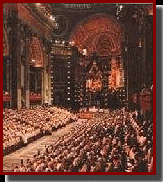LUTHER 1527 The Council of Nicaea, 325.


LUTHER 1527
There is no proof of representation, either, in all the other passages which they quote. For example, where Christ says, “I am the true vine” [John 15:1], he speaks of the true spiritual vine, which he also was, not which represents him. How should it read: “I represent the true vine,” or, “I am represented by the true vine”? Who then is the true vine, apart from any representation? Again, “I am the shepherd” [John 10:11], “I am the door” [John 10:7], “I am the resurrection and the life” [John 11:25], and all the others. All these sayings are expressed and understood in terms of being, not of representing. -Martin Luther
The Council of Nicaea, 325.
Athanasius defends the use of homousios at Nicaea, notwithstanding that it had been previously rejected by the council which condemned Paul of Samosata, and he contends that both councils were orthodox, since they used homousios in a different sense…
NICENE AND POST-NICENE FATHERS (Second Series) VOLUME 14 The Seven Ecumenical Councils (p.5).

4 Comments:
Not long ago I was debating Christ's true presence in the elements of communion with a Calvinist, and he brought up Christ's statement "I am the Door," and basically used it to prove that Jesus employed metaphors.
How do you counter that argument? Could you expound on what Luther means when he talks about all these sayings being expressed and understood in terms being and not representing? Is he simply saying that we should not turn Christ's metaphors into similes? If so, couldn't it also be said that we shouldn't turn the symbolism of metaphors into hard realities? What do you do when someone says, "But Jesus didn't have hinges and a doorknob, and he didn't mean for us to understand that he was literally a door"?
Eric
Hi Eric,
Greetings. You have alot of questions here. Some times I wonder if people even know what and why they say the things they say and think. This here what you have written that others say:"But Jesus didn't have hinges and a doorknob, and he didn't mean for us to understand that he was literally a door"? I have heard that for so long I don't even hear it any more. To me that's just someone not thinking for themselves or saying something from a first glance look at the material. Any way, I am learning from Dr. Luther myself. I go over these writtings a bunch of times and he causes me to think about the text. If you look through some of the previous days on this BLOG he discusses your question using other areas of scripyure as well. I'll say this again, I am learning myself of these things. All of this causes GROWTH if you ask me. I'm in no rush for answers myself, just CHRIST JESUS and HIM ALONE. So I've really not answered your question head on but I would encourage you to read Dr. Luther's Works for yourself.
God's Goodness to you,
IN CHRIST,
Brother Sal
Thanks for publishing so much from Luther's writings, and for your focus on this topic. I'm finding it increasingly fascinating.
Thank you very much for your sincere reply Eric. This all has to be taken slowly,prayerfully,meditatively and the afflictions will follow as well.May Our Lord Jesus Christ show us THE WAY.
Salvatore
Post a Comment
<< Home